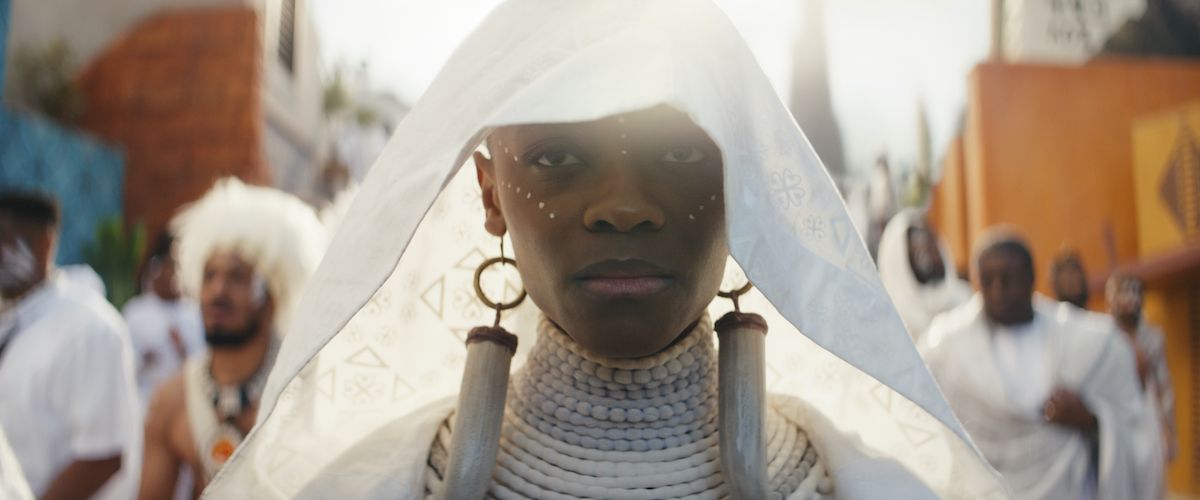By Jonah Naplan
November 10, 2022

Black Panther: Wakanda Forever
Review: Ryan Coogler accomplishes remarkable things in 'Black Panther: Wakanda Forever,' a sequel lacking its Black Panther.

By Jonah Naplan
November 10, 2022

I must give credit where credit is due. Nothing in “Black Panther: Wakanda Forever” would exist today without the extreme talent and equal persistence of director Ryan Coogler. Here he pulls off the near impossible—making a “Black Panther” sequel without Black Panther. It’s a feat of such sheer magnitude that I almost feel like Coogler should automatically win Best Director at this year’s Academy Awards. How’s the movie itself though? Actually pretty good. And that makes the film’s ever troubled production even more remarkable. Watching the movie, I kept thoughts of the death of Chadwick Boseman in the back of my mind. You’d almost think that a movie like “Black Panther: Wakanda Forever” would be disappointingly underwhelming, with no shortage of plot gaps due to the obvious loss of its main character. But it’s not like that at all. The opposite is true, actually. It’s a film with a lot of meat on its bones—new ideas, characters, emotions, and expected connections to other MCU installments. It’s not lacking in any substance whatsoever, resulting in an unnecessarily long 161-minute narrative that could even be described as a “slow burn.” Some viewers may associate that term with “boring.” Here, it’s not.
“Black Panther: Wakanda Forever” opens with the funeral of King T’Challa. The Wakandan royal family, dressed in all white, gathers around the coffin with a Black Panther emblem on the front, as it slowly rises into the sky. Then the Marvel Studios logo plays, but the superheroes it usually showcases have been replaced with highlights from Chadwick Boseman’s career as Black Panther. Even when the film devolves into plotlines that it probably still would have followed had Chadwick Boseman been with us today, “Black Panther: Wakanda Forever” is one big tribute at heart. Both fans of the character and actors who portrayed characters alongside him, are still reeling from the loss of Boseman. The first thing that Coogler gets right, is making the Wakandans go through the same loss that we felt back in August 2020. It’s just another way that we can resonate with this set of characters.
Then the movie jumps forward to present day, or “one year later” as the title card in the movie shows. The country of Wakanda remains in a crisis, with no Black Panther ready to protect them when danger arises. A new issue unfolds when there becomes rumors and eventual evidence that vibranium has been found in other places, one of them being at the bottom of the Atlantic Ocean. Then King Namor of Talokan (Tenoch Huerta) wages war on the country and brings his nearly indestructible army along with him. After a climactic fight scene on a bridge between Okoye and a few of these blue soldiers, the Dora Milaje warrior points out that the blows she threw at them would have killed any normal person, but these people just stood back up again to continue fighting.
The Talokan army heavily reminds me of the Na’vi from “Avatar,” so much so that it almost seemed like a laugh in the face of James Cameron who also has a big blockbuster with underwater creatures releasing this holiday season. Even more so, is the film’s stunning VFX, especially in one scene where Shuri explores the beautifully vibrant underwater kingdom of which Namor rules. “Black Panther: Wakanda Forever” is a film of gentle and not so gentle beauty. Scenes like the one I just mentioned are of gentle beauty, but others are equally as beautiful to look at but aren’t as gentle. The cinematography in several action sequences is mesmerizing, and it fixes a problem that the first “Black Panther” was well-known for having. Much of the CGI in the final battle of that 2018 film looked unfinished, and many of the previous action sequences were shot messily and were hard to follow. Now, in 2022, Ryan Coogler fixes that mistake. To be fair though, “Wakanda Forever” was $50 million more expensive to produce than its predecessor. At least that shows.
What also shows is the emotion in each of our characters’ faces throughout the entirety of the movie. “Black Panther: Wakanda Forever” gives us some of the best performances from the MCU, right up there with Robert Downey Jr. and Chris Evans in “Avengers: Endgame.” I give particular shout-outs to Angela Bassett as Ramonda and Letitia Wright as Shuri. These two women, along with many others, are the reason why this film is able to stay afloat and is also why we feel more invested in the narrative and the stakes of what it means for Wakanda to remain a united nation. The film is not without its humor, but for the most part, “Wakanda Forever” remains a deeply emotional thrill ride, that feels serious and straightforward, especially when compared to things like “Thor: Love and Thunder” and even parts of “Multiverse of Madness” and “No Way Home.”
But for all of its strengths in the production department, “Black Panther: Wakanda Forever” is sometimes lacking in the story department. I personally would have chopped 15-20 minutes off of its runtime, and as much as love Martin Freeman’s character as Everett Ross, I felt that all of his scenes were unneeded. The middle act is very low on action and is very dialogue heavy. I point this out, not because it’s a problem, but because of how much more entertaining I found the first and third acts. The climactic final battle scene—a brilliant setpiece with even more incredible editing—goes back and forth between land and sea as the Wakandan army is pitted against the Talokans and the new Black Panther (if you want to know absolutely nothing, I won’t say who it is) is pitted against Namor.
It’s an expertly contrived sequence, made all the more satisfying because of how the character of Namor was previously built up. Namor is a villain who shares personality traits with Thanos, as his intimidation is very monologue-based and heavy. The way he looks at life is philosophical, and it sometimes feels unfair to call him an antagonist. Like the best villains though, he’s simply doing what he thinks is right. And he’s cool to watch in battle. The simple truth is that it’s easier to feel the vengeance and emotions these characters possess as long as it can be conveyed in a way that feels natural. And nothing about “Wakanda Forever” feels artificial. All of it feels like it has a reason for being, and never feels contrived or forced like some of the other Marvel projects. Even the signature Marvel humor doesn’t feel dull. There are no bad puns or dad jokes like in “She-Hulk: Attorney at Law,” and no cartoonish stunts like in “Thor: Love and Thunder.”
Everything about “Black Panther: Wakanda Forever” feels grounded and realistic, even if its entire premise is fantastical. And that’s the very thing we needed in the MCU right now. I enjoyed the past two Marvel movies from this year, but “Wakanda Forever” is certainly the best of 2022. It doesn’t see itself as a part of the MCU timeline, or even as a fragment of the bigger picture. It wants to ensure that the audience enjoys “Black Panther: Wakanda Forever” as a movie, and not as a setup for other things that have nothing to do with the Talokan/Wakanda battle. It’s the very reason why we all fell in love with the MCU in the first place. I applaud Ryan Coogler, the film’s cast of incredible actors, and the VFX artists who helped to pull off the impossible. What they accomplished is a cinematic achievement.
Now playing in theaters.
"Black Panther: Wakanda Forever" is rated PG-13 for sequences of strong violence, action and some language. It's 161 minutes.
JONAHtheCRITIC.com